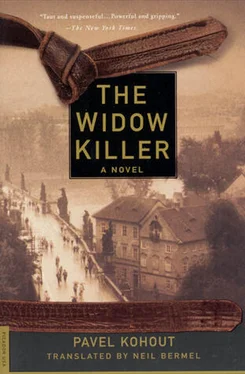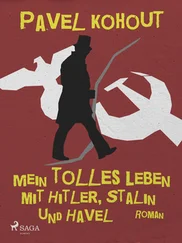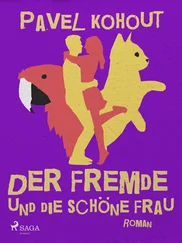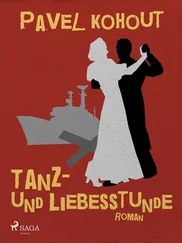Why am I doing this, Morava mused: Jitka, my beloved, am I looking for the quickest route to you? Or do I want to give life without you some other meaning? But why am I dragging poor Litera with me? He shuddered; Litera dotes on his family as much as they do on him! Too late now….
The scene was all the more unbelievable for taking place in broad daylight in a metropolis virtually unscarred by war. Two rows of lifeless, locked-up apartment buildings formed a channel, and a multitude of people who, a short while earlier, had been living quite ordinary lives in similar houses now filed along it toward an inescapable fate. Tanks rumbled behind their backs, their treads scraping along the cobblestones and tram tracks.
The front row reached the place where the sloping avenue turned right. A barricade about three hundred yards distant appeared around the bend. Tramcars placed end-to-end formed a sizable barrier just as they had uphill; here, however, they were reinforced by a high, impassable mound of cobblestones. Above them flew the Czechoslovak flag.
The Czechs stopped. Surprisingly, the soldiers made no immediate attempt to drive them forward. Gradually even the din of the tank treads subsided. In this place full of men and machines silence reigned, broken only by a strange sound Morava had never heard before. Then he realized he was breathing loudly to calm the wild beating of his heart. The unfamiliar sound was the agitated crowd’s collective breath.
It had started to rain, but no one noticed.
The barricade too was silent. But they have to shoot; they have to risk it! Strange, Morava thought, now I have time to face the fact that in a few moments my life will be over, but I’m still not afraid. Did my sense of self-preservation — all my feelings, for that matter — irretrievably disappear when you did, Jitka? Or is it merely resignation, a consequence of realizing that once God is lost life itself has no meaning, since it can end so capriciously and stupidly time after time? A voice broke into his thoughts.
“Shouldn’t we scatter? It’ll open up the Germans and our side could shoot.”
It was a very young girl to his right asking.
Why didn’t I think of that, he wondered; she’s right!
Before he could answer, fighting broke out from a completely different direction than they had expected; a wild cannonade and machine-gun bursts rang out behind their backs, somewhere up on the hill they had just left. Everyone, captives and captors, turned that way. They saw a tangle of sparks striking the treads of the rapidly turning tanks, and then confusion in the German ranks. The SS men left the hostages to their own devices and scurried behind the metal colossi.
“The Americans!” someone cheered.
Vlasov’s men, Morava thought; thanks, Mr. Beran!
Many apparently had the same idea as the girl; suddenly they scattered toward the barricade, dragging the rest with them.
Immediately the barricade began to shoot past the fleeing hostages, but the Germans aimed their retaliatory fire right at their own prisoners.
Panic broke out. Some of the hostages flung themselves on the ground, others kept fleeing toward safety. Screams nearly drowned out the fire. The girl tripped on a body, lost her balance, and fell. Morava went back for her and picked her up. Suddenly he saw red. He blinked in vain. Then his forehead began to burn sharply. He reached up to it and felt a sticky liquid. Instantly strong hands pulled him forward and from somewhere he heard Litera.
“Come on, Jan, just a little bit further!”
He came to on wet sand originally covered by paving stones. The girl was binding his head.
“You sure got lucky, Mr. Policeman. Skin of your teeth!”
The distant battle still raged; here men and women were waging a noisy argument in its place.
His forehead burned agonizingly and his head would not stop humming, but at least he could see. He tried to look over his shoulder.
A familiar face leaped out from a small group of armed men arguing with an indignant crowd. He could not believe his eyes.
“Mr. Litera…” He looked around for him. “Josef…!”
“Lie down,” the girl insisted. “You’ve lost a lot of blood. Your colleague is hunting up a car.”
He strained his eyes.
It was him.
Rypl!
Then the image dissolved again like a phantasm.
The pretty boy behind the wheel of the Mercedes looked glassily toward the bridge; his chalk-white cheeks made the violet bruise under his right eye all the more noticeable.
“I hear he doesn’t like us anymore,” Lojza explained. “Should we give him to Pepik too?”
The driver’s mustache trembled noiselessly like a guinea pig.
“Or what should we do with him, boss?”
The title warmed him.
DID YOU HEAR THAT, MOTHER?
“Any of you know how to drive?” he asked his men.
They shook their heads in unison. He repeated Lojza’s phrase.
“His bad luck, then. He’ll have to put up with us until we get a replacement. Pepik!” He handed the boy the pistol he had confiscated on the hill from that stupid cop in civvies. “The next one’s yours as well. Forward!”
Then he looked at the bridge and was unpleasantly surprised.
“Where’s…?”
“I sent him over the edge,” his boy crowed proudly. “He’s gone for a swim!”
Over by the towpath’s stone wall, the caretaker’s body bobbed and floated close under the black tower, just above the weir. With this slow movement the past closed behind him.
NOW NO ONE CAN PROVE ME GUILTY!
Meanwhile the rain and the distant gunfire intensified. He decided to follow the battle’s voice. However, false echoes plagued Prague’s hills and valleys, and they were no closer to the uprising when they reached the last barricade in the Nusle valley. Here they were leery of turning up toward Pánkrac, which was supposedly swarming with Germans, and he was just about to turn around when the messengers brought two pieces of news.
The first brought murmurs of horror: the SS were driving whole blocks of residents uphill as human shields. They were trying to break through to the city center, and that meant going through Nusle. The second seemed too wonderful to be true, but because enough telephones were fortunately working, several randomly dialed extensions in the suburbs immediately confirmed it.
Yes, they insisted one after the other enthusiastically, they were already celebrating; an hour ago the Russians had liberated them, or more precisely some Russian units disguised as Germans — no one really understood it, but the soldiers were definitely moving onward to clear Pankrác.
He ordered that the Mercedes be left in the next side street, so that in an emergency they would have it at hand, unscathed. The boy took the keys; the driver had obeyed him like clockwork since the incident with the caretaker.
MY APPRENTICE!
Not that he didn’t trust the other two, but he felt absolutely sure he could always trust the boy with his back.
As the four well-armed fighters approached, a man in the uniform of a prewar staff reserve captain hurried over and welcomed them to his unit. He was trying, he explained eagerly, to bring some order to yesterday’s chaos by securing an effective defense at the price of minimal losses in at least this one place.
Were any of them officers? He was the only one to come forward. Yes? And what rank? He remembered Brno and conferred on himself the rank Králik had been preparing him for.
“Sergeant.”
“No!” The captain was overjoyed. “Heaven must have sent you!”
Taking his new sergeant aside, he confided that even after repeated requests for reinforcement, he still had no experienced men here, despite their strategic location. The sergeant’s arrival had increased the barricade’s firepower almost twofold; otherwise all they had was a light machine gun and a couple of ordinary rifles. The captain was nevertheless determined to defend the barricade and expected the sergeant to insure the precise execution of all his orders.
Читать дальше












